Blog Archive for July - August 2004
Trying Again
Posted at 9:30 p.m. on Saturday, August 28, 2004
If you’ve been reading my blog for several months, you may remember the minor tragedy that struck my family last spring. We got a brand new puppy at the beginning of April, a delightful Golden Retriever named Mandy. But on April 30th, for no good reason, she choked so badly on a bit of food that she ended up dying the next day from injury done to her lungs. It was a sad time for my family, especially for my two children. We wanted to get a new puppy right away, but the busyness of summer made this unwise. So we waited and waited. Finally, last week we got our new dog, another Golden Retriever puppy named Sandy. Yes, her name is in memory of Mandy. And, ironically, Sandy is a much lighter color than Mandy, almost the color of sand. |
 |
|
Mandy |
||
Now we’re back in the middle of puppyhood. It's almost like having a new baby in that we’re once again focused on the basics of life: eating, sleeping, and going potty. I’m thankful to report that Sandy seems to be getting the hang of these basics, plus she’s doing pretty well with “sit.” Now if we can help her learn that biting is not nearly as fun for us as it is for her. . . .
 |
I’m impressed with how much our experience with puppyhood is helping my kids to learn about life, both its joys and its sorrows. There are plenty of joys, mostly having to do with a puppy’s playfulness and exuberant love. The sorrows, of course, have to do with death and loss. There are plenty of other lessons as well for my kids. For the first time in life, they’re learning how to exercise loving but firm discipline. I expect this will serve them well in the future when they have children. (No doubt my grandkids will be great at “sit” and “fetch.”) | |
Sandy on the day we brought her home |
||
As we begin with a new puppy, I’m also reminded of the preciousness and fragility of life. I think we all have fears that Sandy, like Mandy, will die in some tragic way. We’ve talked about this as a family, and have agreed that we’ll just have to love Sandy each day, hoping for many days ahead, but trusting God for the things we can’t control.
Come to think of it, this isn’t a bad lesson for the rest of life. There’s so much in this life that you and I can’t control. Our vain efforts and worries won’t overcome this limitation. Yet we can indeed choose to love well today, to touch with God’s love every person he brings across our path. Not a bad plan at all!
The Parking Lot Courtesy Creed
Posted at 9:30 p.m. on Friday, August 27, 2004
Recently my blogging has been pretty heavy, so it’s time for me to blow off some steam. I’ll get back to my series “Lessons from a Church in Crisis” soon.
A couple of days ago I was driving in a large parking lot in Irvine, California, the city where I live. This is one of those lots where they jam in as many cars as the law allows, leaving very little space for driving, let alone for walking from your car to a store. As I cruised down one of the narrow lanes between parked cars, I came up upon the back of a pedestrian. He was walking in the middle of the driving lane, seemingly unconcerned about the fact that a two-ton behemoth was bearing down on him. I expected that he would move slightly to the side so I could pass, but this sensible and polite act never entered his thick head. Instead, he continued to saunter down the middle of the asphalt lane, seemingly pleased with himself for holding me up. Not only did he make no effort to move to the side, but in fact he seemed to slow down just a bit to prove his power over me. And power he had! Though I could have flattened him with a mere twitch of my big toe, I did indeed creep along behind him for what seemed like thirty minutes. In reality it was probably thirty seconds. All the while my teeth were grinding, my stomach was churning, and my mind was filled with very un-Christian thoughts.
This isn’t the first time I’ve run into (well, not literally) such a phenomenon. In fact it seems like this happens to me fairly regularly. At least once a week I come up upon pedestrians who seem utterly oblivious to the fact that they are walking in the middle of my driving lane. They don’t watch for approaching cars. Nor do they move out of the way if cars come along. They are either stupid or obnoxious or, as I imagine, both. In fairness to pedestrians, I must say that drivers in parking lots aren’t exactly angels either. Just yesterday I was walking through the same parking lot I mentioned earlier. I was watching carefully for traffic because I’m not especially eager to be run over by a speeding SUV. Good thing I was watching, because a young man was driving around the lot as if he were competing in the Daytona 500. If I hadn’t have jumped back from his approaching auto, I may well have been knocked into the next county (or the afterlife!) by his zooming front bumper. |
 |
|
| These two women walked in front of my car without even looking in my direction, and were slow enough for me to take their picture! |
||
 |
I just don’t get it. Isn’t it obvious to everyone that pedestrians and cars must share parking lots? Doesn’t it seem that a little courtesy will make everyone’s experience more pleasant, not to mention less lethal? I’m inclined to ask Rodney King’s classic question of our behavior in parking lots: Can’t we all get along? If I had the time, I’d start a movement of people committed to parking lot kindness. But, frankly, I don’t have that kind of time. So, for now, maybe I can get you to join me living by the “Parking Lot Courtesy Creed.” |
|
Here's what I want to avoid. (Don't worry. It's just a plastic dummy.) |
||

Okay, the last line of the creed was a bit off topic. It’s another pet peeve, worthy of another day’s post.
A Telltale Sign of the Future of Christianity, Part 2
Posted at 9:40 p.m. on Thursday, August 19, 2004
In yesterday’s post I commented on the recent decision by two Southern Californian Episcopal churches to leave their American denomination and join the Diocese of Luweero in the Anglican church of Uganda. I'm watching the developments of this story closely and, as you might expect, it's getting pretty messy. I'll keep you posted in the days to come, but now I want to focus on an aspect of this story that seems to me to be truly significant.
Of course the attempted departure of two churches from the local diocese is newsworthy, especially when it is a response, in part, to the Episcopal Church USA’s endorsement of homosexuality. But the real, lasting story, lies elsewhere. And this story, I believe, is a telltale sign of the future of Christianity.
What is the future of Christianity? I would suggest that it is both biblical and southern (as in "southern hemisphere," that is). First, as I explained in yesterday’s post, neither St. James Church nor All Saints Church used the terms “gay” or “homosexual” in their press releases. This wasn’t just a matter of their getting the spin right. Rather, they were making the main thing the main thing. These two churches have broken ties with the Episcopal Church USA, not primarily because of homosexuality, but because of biblical authority and its implications. They have come under the jurisdiction of a Ugandan diocese that upholds the authority of Scripture above all other authorities. The same cannot be said for the Episcopal Church USA as a whole, at least in the perspective of St. James and All Saints.
Although millions of North American and European Christians continue to uphold the authority of the Bible, many mainline denominational officials and seminaries do not. For those of us who live in the Northern Hemisphere, it can seem as if all of Christendom is moving in a liberal, non-biblical direction. But nothing could be further from the global truth. The vast majority of Christians throughout the world today uphold the authority of Scripture and seek to live by its standards. And whereas more liberal denominations are losing members hand over fist, biblically oriented Christianity is growing impressively throughout the world, especially the southern half of the world.
This points to the second dimension of the future of Christianity. It will be solidly southern, by which I mean “southern hemisphere.” If you were to track the growth of Christianity around the world today, you’d find massive expansion in Africa and Latin America, even in Asia, growth that more than makes up for the mainline losses in Europe and North America.
Take the Episcopal Church, for example. The Anglican Communion (as it is called outside of the U.S.) began as an English church (literally, “Anglican”). But over the years it has grown to a worldwide denomination (or “communion”) of more than 77 million people in 164 countries. The Episcopal Church USA includes about 2.5 million members, or 3% of the worldwide total. The Church of England, though claiming as members most of the country, has a tiny percentage of its “members” actively involved in church. According to a recent census, the population of England is just over 49,000,000, with the whole UK just under 60,000,000. In the latest Church of England statistics, each week there are 1,002,000 people in Sunday services, or just over 2% of the country. The number of active Anglicans in England is somewhere around 2,000,000, with half of these folk in church each week.
Now consider the case of Uganda. The current population is over 26,000,000. By conservative estimates, over 9,000,000 of these are Anglicans (about 35% of the country), most of whom are actively involved in church. This means that every Sunday there are more Anglicans in church in Uganda than in England and the U.S. combined. (The African country with the greatest number of Anglicans is Nigeria, with more than 18,000,000 members.)
What’s happening in Africa is similar to what’s going on in Latin America and elsewhere in the Southern Hemisphere. While Christianity wanes in Europe, it flourishes in the places once colonized by Europeans. Even today there are more Christians in Latin America, Africa, and Asia than in Europe and North America combined. As Philip Jenkins observes in his excellent book, The Next Christendom, “If we want to visualize a ‘typical’ contemporary Christian, we should think of a woman living in a village in Nigeria or in a Brazilian favela” (p. 2).
A telling sign of the biblical and southern future of Christianity appears in the story about two Southern Californian churches coming under the authority of an African diocese. Yet it easily escapes notice. I’m speaking of the fact that the rector (senior pastor) of St. James Church is a man named Praveen Bunyan. Though I don’t know the Rev. Bunyan or much of his story, I do know that he was born and raised in India.
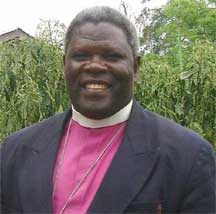 |
Thus, here is the real story behind the so-called "church schism over gay issues." An episcopal church in Newport Beach, California – where nine out of ten people are non-hispanic whites – is pastored by an Indian man, who, because of his commitment to biblical authority, has led his church to come under the leadership of an African bishop. This is, I believe, a telltale sign of the future of Christianity. If you want to know what Christendom will look like in the future, look to the Bible, and look south, far south. | 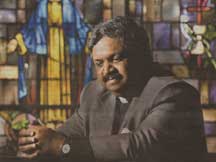 |
||
The Right Rev. Evans Kisekka, Bishop of the Diocese of Luweero in Uganda |
The Rev. Praveen Bunyan. rector of St. James Church in Newport Beach, California |
|||
A Telltale Sign of the Future of Christianity, Part 1
Posted at 9:00 p.m. on Wednesday, August 18, 2004
A headline in this morning’s Los Angeles Times caught my eye: “Church Schism Over Gay Issues” (Orange County Edition, Part B, page 1; same article with different headline online). Two prominent Episcopal churches in Southern California have announced their intention to break ties with the Episcopal Church USA and the local Diocese of Los Angeles. Yet these churches did not do what so most other Americans do when they become dissatisfied with their home church: start an independent church. Rather, All Saints Church of Long Beach and St. James Church of Newport Beach voted unanimously to place themselves under the authority of the Anglican Province of Uganda in the Diocese of Luweero. Therefore, “schism” doesn’t accurately describe what happened. This isn’t a church split so much as a realignment.
Why did All Saints and St. James leave the Episcopal Church USA? The answer comes from the press release issued by the leadership of St. James:
The members of St. James have remained steadfast and loyal in their commitment to the Holy Scripture, the historic teachings of Christianity and the Anglican Communion for 55 years. However, the Episcopal Church USA has chosen a path that no longer reflects the membership’s steadfast faith.
"St. James is a biblically orthodox church that accepts Jesus Christ as the One and Only Lord and Savior, and acknowledges the authority of the Holy Scripture as the Word of God," said Senior Warden Jim Dale. "Our devotion is to God, not a particular institution. When an institution no longer represents our understanding of God’s Word and His Will, we must have the courage and faith to stand by our convictions."
Furthermore, The Rev. Praveen Bunyan, rector (senior pastor) of St. James explained:
|
 |
|
The Rev. Praveen Bunyan |
||
"The members of St. James wish to move beyond this issue, so we can concentrate on our core mission: To glorify God, uphold the Holy Scripture, raise our children to love and serve Jesus Christ and share the Gospel with the world.”
Given the headline in the LA Times, “Church Schism Over Gay Issues,” I find it striking that the actual press release from St. James (and also from All Saints) never actually used the words “gay” or “homosexual.” Undoubtedly the Episcopal denomination’s endorsement of homosexuality lies behind the decision of these two churches, but they see the major issue quite differently. It’s not about sexuality, but biblical authority. Consider this explanation by the Senior Warden (head lay leader) of All Saints Church:
“Holy Scripture remains a constant in our lives. . . . It holds authority over us and inspiration for us. As we watch the Episcopal Church USA move away from this authority, we remain convinced of its truth. Therefore, our prayerful decision is to continue in that scriptural authority with the vast majority of our fellow Anglicans around the world.”
The issue of homosexuality, therefore, is simply a symptom of a deeper problem, according to the leaders of St. James and All Saints -- the rejection of biblical authority and teaching by the Episcopal Church USA.
According to the Times, local Episcopal authorities were surprised by the actions of these two churches. Los Angeles Bishop J. Jon Bruno fired off a letter rebuking the Diocese of Luweero and stating that he will not release these two parishes. In typical American fashion, Bishop Bruno said he has “taken and sought counsel” from church lawyers. Indeed, the story isn’t over.
What I find most fascinating about this story isn’t the familiar, headline-making brouhaha over homosexuality, nor the intrigues of church politics, but something far more significant. The real story behind the story, I believe, is a telltale sign of the future of Christianity. I’ll get to this real story in tomorrow’s post.
Guest Columnist: Rob Asghar Returns
Posted at 10:00 p.m. on Friday, August 13, 2004
| Note: I’m pleased once again to introduce my guest columnist, Rob Asghar. If you aren’t familiar with Rob, you may want to check out my first introduction of him. Rob brings a unique and timely perspective to the world’s events, as a Pakistani-American former-Muslim Presbyterian who has lived on four continents. You can contact Rob at rasghar@cox.net. The following article first ran in the Philadelphia Inquirer, August 27, 2002 . I’m pleased to be able to offer it here. | 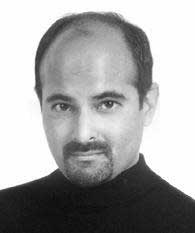 |
In a Nation Known for Bigness, Being Big-Hearted is the Key
by Rob Asghar
When I was 13, my family moved from Springfield, Va., to Pakistan. One afternoon, while we awaited a table at an Islamabad restaurant, my father bumped into an acquaintance. My father explained to the man that I was still getting adjusted to my new Third World setting, and that I much preferred to live in the United States.
"Is that true?" the man asked me. "My child, what do you prefer about America?"
"Um. Well.... They have bigger cars there."
Later, my father was nettled. "Knucklehead! Bigger cars? That's your wise answer about what makes America great?"
Um. Well.... I was just 13. How much did I care about free speech? Or open-market approaches? Or easy access to family planning? What did excite me was that our old American Ford LTD was big. And solid. And luxurious. Meanwhile, the tiny and pug-like Japanese cars that littered Pakistani streets were as wobbly as that nation's economy. Yes, the LTD was a brontosaurus with an asteroid looming above, and the gasoline crisis would soon reshape the landscape in favor of those unsightly, scurrying Japanese mini-mammals. But as soon as the dust cleared, Americans were right back to driving mammoth SUVs as though they actually had a date with a fishing rod. |
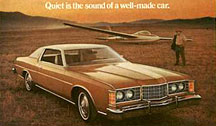 |
|
Ad for a 1973 Ford LTD: "Quiet is the sound of a well-made car." |
||
Do I stand by my pubescent view that "big cars" made America great? Um. Well .... Yes. What makes America great is indeed its bigness. It is big at heart, big in spirit, big enough to house many shades and shapes of people, big enough never to panic, big enough to care for others. Just generally big. Big cars and big TV screens are a symptom of the overflowingly American spirit.
Most important, America is big enough to be humble. America possesses a dramatic self-awareness that perhaps no other society has ever had. Yes, many liberals imagine this society is no better than New Guinea. And many conservatives imagine it's no better than Sodom. But most of us live in a comfortable middle, recognizing we live in a flawed but gloriously wonderful nation. The humility is a gyro-compass, redirecting us gradually through challenges such as slavery, women's suffrage, civil rights, bioethics, and so on. As writer Dinesh D'Souza notes, we're unusual not for having permitted slavery, but for having gone through monumental agonies to abolish it.
Just a few days after Sept. 11, the big-heartedness of America was on display to the world. At a prayer service in Washington's National Cathedral, Muslims, Jews, Protestants and Catholics came together at the darkest moment of grieving, the hour in which it is hardest to embrace one unlike yourself. Such a poignant spectacle would not have been visible after a crisis in Pakistan, nor would it even have struck onlookers as poignant.
Many Americans were amazingly able, after some days of grieving and fully merited righteous anger, to ponder aloud, "If others hate us, why is that; and can we do something about that?" People on most other corners of the planet wouldn't summon the self-awareness or humility to ask such questions.
The difference between saints and sinners is that saints have eyes to see their sinfulness. Sinners don't. Saints work at it, never losing their humility. That takes a big and overflowing heart. That big heart sometimes veers toward gluttony. And we see that in our own consumer-craziness. But greatness of spirit and grandness of scale do involve the risk of excess or mishap. It's not just a sign of how bad we are, but of how good we are.
So the 13-year-old who liked big cars was wrong, but somehow very right.
Guest Columnist:
Rob Asghar Returns
Posted at 10:00 p.m. on Thursday, July 29, 2004
| Note: Last week I introduced my first guest columnist, Rob Asghar. If you missed this intro, you may want to check it out. Rob brings a unique and timely perspective to the world’s events as a Pakistani-American former-Muslim Presbyterian who has lived on four continents. You can contact Rob at rasghar@cox.net. The following article first ran in the Charlotte Observer. I’m pleased to be able to offer it here. |  |
Valuable Anchor in a Cultural Storm:
Focus on the Family Doesn’t Deserve to be a Whipping Boy
by Rob Asghar
I have witnessed two meaningful pilgrimages in my life. The first was a trip to Mecca at the age of 5; the second was a tour of the Colorado Springs headquarters of the oft-criticized Focus on the Family, at the request of a friend who took a job there.
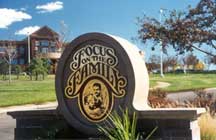 |
The tour itself did not rivet me. What riveted me was the throng of families -- ordinary Americans, suburban soccer moms, restless tykes in shorts, babies and toddlers -- who journeyed from across the country to pay homage. And although the pilgrimage to Mecca is generally performed as a duty, the trek to Colorado Springs is done out of sheer, uncommanded gratitude by men and women whose marriages have been saved and whose families have been strengthened. | |
Focus on the Family
headquarters in Colorado Springs |
||
In the new culture war raging in Colorado, Massachusetts, Canada and elsewhere, a fashionable myth attacks these "Focus families" as ignorant sorts who loathe sexuality. The reality? They love it, enough to employ scriptural and psychological truths as guardrails that nurture this life-giving force while containing its Pandora's Box aspects. You may shudder at the thought, but Jim and Shirley Dobson most likely have a more meaningful sex life than you do.
You will not find this statistic in The New York Times, but 96 percent of Focus on the Family's money is aptly focused on families -- helping real people with real struggles. Only 4 percent goes to the area in which Focus gains its notoriety: public policy.
Granted, evangelicals and religious persons of all stripes have historically been found guilty of a sin of omission: of not going out of our way to protect the dignity and welfare of homosexual youth and adults when rednecks and bigots delighted in tormenting them and shattering their lives. We've been late in clarifying our respect for the fundamental dignity of each gay and lesbian.
These pundits miss a crucial point. Today's gay-rights movement reflects less of an upward evolution in civil rights and more of a perpetual cycle in which traditional forms of sexual experimentation alternate with traditional forms of sexual morality.
I can add a cliché: Some of my best friends are gay. A few found greater fulfillment in pursuing a traditional nuclear family over pursuing a gay lifestyle; others tried living a heterosexual life, then finally decided they'd rather die than fight competing inclinations.
My approach is to embrace both groups of friends. In the case of the latter group, I don't judge them -- but neither do I tell them their sexuality is "normal." (As a person who has struggled with the disease of alcoholism, I don't consider myself to be "normal" either.) There is solid yet politically incorrect scientific data to back up my conviction.
The head of the International Gay & Lesbian Human Rights Commission, Paula Ettelbrick, recently told the Los Angeles Times that gay marriage is a first step in an effort to "push the parameters of sex, sexuality and family, and in the process transform the very fabric of society."
Fair enough. That's what liberals are here for: to fight for change. And conservatives are here to fight to preserve the best aspects of our heritage in the face of change. Indeed, on a turbulent sea, it would take a certain manner of fool to cut loose his anchor to spite the concept of restraint.
Further, the Focus branch of American religion is far more mainstream than that of right-wing American fundamentalism (which shuns popular culture rather than attempting to dialogue with it). It is also more mainstream than the most rapidly expanding blocs of Christians and Muslims: those in Africa and Asia, who will ultimately determine what global morality will look like over the long term.
Liberals' appropriation of Focus as a whipping boy isn't just wrong, it's impractical. Many Focus supporters such as myself are longtime Democrats who, feeling marginalized for bearing religiously based opinions on moral issues, found ourselves increasingly voting Republican. No Republican would have reached the White House in the past quarter century if not for people such as me.
As the Earth's societal forces churn with unfathomable power, and as the Third World becomes a militantly conservative bloc ready to clash with a secular and morally exhausted West, organizations such as Focus on the Family are hardly instigators -- they are sure anchors and civic treasures.
It's Nice to be Quoted,
but . . .
Posted at 9:30 p.m. on Saturday, July 24, 2004
It's funny what you can find on the Internet. Surfing around the other night, I stumbled across an editorial from the The News Sentinel of Fort Wayne, Indiana. The focus of the editorial was the cross on the seal of Los Angeles County, and the ACLU's effort to get it removed. Much to my surprise, I was quoted in the editorial, or, to be accurate, my blog was quoted. Wow! Happy surprise!
There is a bit of downside to this story, however. Let me give you the quote from The News Sentinel:
As noted by Mark D. Roberts, senior pastor of the Irvine, Calif., Presbyterian church, “(the cross) wasn’t included on the county seal to encourage people to remember the meaning of the death of Jesus or to propogate faith in Juses, but rather to recall the crucial influence of the Christian missions in the history of Los Angeles County.” He offers this analogy: If a public school history textbook did an article on D-Day, and included a photograph of the Normandy American Cemetery with its over 9,000 crosses on the graves of our soldiers, would the ACLU argue that the textbook was promoting Christianity?
So what's the problem? If you read closely, you'll notice that I apparently said the cross on the seal wasn't included "to propogate faith in Juses." There are two problems here. One, I look like I can't spell. "Propogate" isn't quite right; "propagate" is better. And, yes, I checked my blog to see if I had made a mistake. No editors, you know. Well, the mistake wasn't mine. The second problem is with this "faith in Juses" idea. That sounds a little fishy, doesn't it? One wonders if I'm trying to weedle out of a problem by talking about "Juses" rather than "Jesus." Or, of course, there's the possibility that, once again, I didn't check my spelling. But, as it turns out, my own self-editing is more reliable than that of The News Sentinel. (One of blogging's biggest challenges, I find, is self-editing. I'm always grateful when faithful readers send in corrections.) |
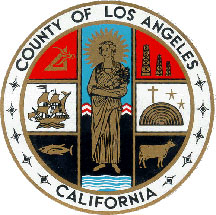 |
|
| The seal of the County of Los Angeles, with its little, teeny, tiny cross. | ||
So, to all of my blog readers in Fort Wayne, Indiana, please don't worry. I'm not quite as sloppy as I sound. And I'm not in the least into the worship of Juses.
My First Guest
Columnist: Rob Asghar
Posted at 10:00 p.m. on Friday, July 23, 2004
| Note from Mark: I’m pleased to introduce Rob Asghar, my first guest columnist. Of course you may already be familiar with Rob, because his essays and commentaries have appeared in more than two dozen newspapers, including the Chicago Tribune, Wall Street Journal, and Denver Post. For several years Rob was the speechwriter for the president of USC. He has also contributed to many other books and articles. Rob is a Presbyterian with a unique background. He grew up as a Muslim, having lived in Pakistan (where is family is from), Iran, Germany, Uruguay, Bangladesh, New Hampshire, Virginia, and, finally, California. Rob brings a unique perspective to the events of our day, as well as a sharp quill. I’m delighted to be able to post one of his writings today, and will do so again in the future. You can contact Rob at rasghar@cox.net. The following post is from a book Rob is writing on the immigrant experience in America. |  |
The America Bug: Life in U.S. has a Way of Catching On
by Rob Asghar
My father left a mud-hut village in Pakistan to come to America, hoping to receive some technical training. He had not counted on catching the "America bug," but that's what happens to unsuspecting visitors -- and the world is becoming a better place for it.
Dad enrolled at North Carolina State University nearly 50 years ago and earned a degree in electrical engineering. On a brief return to Pakistan, he met my mother at a wedding -- their own. You may realize this means it was an arranged marriage.
The prefabricated couple decided to spend "just a few years" in the United States because of the job opportunities here. And they took on more of America than they had bargained for.
The "America bug," a sort of mad-cow disease for immigrants, was first described to me by a college president who noticed that foreign students tend to catch a cultural infection here that bends their plans and warps their dreams. If they return to their homeland, they wish it was more like America, and will work to make it so. Often they choose not to go home, or choose to return to America after a while.
Once infected, you begin to see life in a cockeyed manner; you begin to believe you can write the script of your own life instead of letting family or culture write it for you; you fume on your visits back home that life there is too corrupt or inefficient or boring; and while you're concerned about the feckless morality of America, you also sense that these Americans aren't overly uptight, and something feels right about that.
And when your children begin to drift from your heritage, as was the case with my father's progeny, you may stay awake late cursing this place, but you suspect your destiny is tied inextricably with it.
Europeans spilled blood over issues of morality, papal authority and the nature of the bread served during Communion; this helps explain why they now flinch when God is even mentioned. In the case of Christendom, what finally freed up the best in religious thought and deed? The America bug did. The New World bespoke life, liberty and the pursuit of the good life. Americans were willing to fight to the death for justice, but not over private matters of conscience.
Similarly, the America bug is what might slowly kill off the fanatic appendages of latter-day Islam.
America, stunningly, has not faced a major terrorist incident on our soil since 9-11. This may be due to luck, prayer and outstanding work on the part of our government workers; but there is another reason that would-be terrorists have failed to make a dent here since that black September day. "A lot of these guys lose the jihadi, desert spirit," an intelligence agent told Newsweek. "They get families, they get jobs and they lose the fire in the belly. Welcome to America."
Welcome, indeed.
My parents rued that my older brother and I were growing up "much less Pakistani" than they'd hoped, but they made peace with it.
Still, they tried another strategy with their youngest son, sending him to Islamabad to learn the right values. In an eerie recapitulation, he decided to come to the U.S. for an education. He went home again briefly to take part in an arranged marriage, brought his bride to the United States hoping to spend "just a few years" establishing a career, and well, you know the drill.
He and his wife sense they're here to stay. They hear me talk about the idea of an America bug and they nod. They have caught it, or it has caught them.
Their 2-year-old daughter, Mariam, is the future of Islam. The willful urchin will someday bicker with her mom and dad over whether she needs to observe halal (the Muslim version of kosher) food standards. Already a fan of floral dresses, she will likely protest their disdain for skirts at parties or shorts in gym class. Already a devastating charmer, she will keep them up at night when puberty arrives in all its terror.
They will wonder why they did not whisk her back to Pakistan when they had the chance. And then, like my father before them, they will remember the confounded America bug.
After navigating those icebergs, they will find that America changed their approach to life, just as it has changed everything else it has touched. They will see that America gave their faith the slack it needed to adapt to a new era. They will be grateful for America, and so, eventually, will our world.
Mel Gibson and Passion
Updates, Part 2
Posted at 10:00 p.m. on Tuesday, July 20, 2004
Yesterday I began a two-part series noting some interesting news items relating to Mel Gibson and The Passion of the Christ. Today I complete the series.
Mel Supports the Cross
| According to the Herald Sun News in Australia, Mel Gibson has planned to invest $140,000 in the effort to keep the tiny cross on the seal of Los Angeles County. Ever since the Los Angeles County Board of Supervisors voted to remove the cross from the seal, under pressure from the ACLU, people throughout Los Angeles have been in an uproar. Many of these are not Christians, but Jews, Buddhists, secularists, and others who believe that its wrong to erase the truthful history of Los Angeles by erasing a tiny cross, which could hardly be seen as promotion of Christianity. (For my opinions on this issue, see The Los Angeles Cross Controversy.) |  |
There is no truth to the rumor that Mel Gibson will donate the money only if the City Council promises to translate the words on the seal into Aramaic.
And there’s no truth to rumor that Gibson will use profits from The Passion of the Christ simply to buy the County of Los Angeles. He’s far too smart an investor for this.
The Passion Can Be Shown in Malaysia, But . . .
Much to the surprise and delight of Christians in Malaysia, the government censors have approved screening of The Passion of the Christ. This was unexpected in a country with a large Muslim population, which banned the viewing of cartoon The Prince of Egypt in 1998.
 |
But, the censors disallowed all advertising of The Passion of the Christ, and ruled that only Christians can see it. But, the fact is that many Malaysians have already been able to purchase and view the film on DVD, because DVD piracy is widespread in Malaysia. In fact, John Dvorak has referred to Malaysia as the “Vortex of Piracy” in today’s world. |
Mel Gibson and Passion
Updates, Part 1
Posted at 10:00 p.m. on Monday, July 19, 2004
Things have been pretty quiet on the Mel Gibson and The Passion of the Christ front these days, but I did note a few interesting tidbits in the news. The first is an article that appeared in today’s Los Angeles Times. The other tidbits I’ll explore tomorrow.
In the Aftermath of The Passion: "The furor, the fizzle"
The Los Angeles Times includes an article today on life after The Passion of the Christ. This piece by Roy Rivenburg is well-researched and thoughtful. It’s even rather humorous at points. It begins:
The predictions came fast, furious and occasionally farfetched. Critics warned that Mel Gibson's blood-drenched epic "The Passion of the Christ" would lead to firebombed synagogues and other anti-Jewish violence. Gibson supporters raved about the film, forecasting a "spiritual tsunami" of mass conversions to Christianity and divine healings in theaters.
The only thing both sides seemed to agree on was that the movie possessed an astonishing power to alter lives and beliefs. Yet, five months after the film's debut, the prophecies have yet to materialize.
Rivenburg adds, however, “"The Passion's" legacy could subtly reshape Christian worship habits for years” – not exactly a minor impact if you ask me.
The article reminds us of the furor over the movie before it was released, with a rabbi in Israel claiming that “By the time the first nail is hammered into the cross, viewers in Germany will be passing around knife sharpeners in the theater.” Didn’t happen.
In one of the more ironic segments of the article, Rivenburg cites the prediction by Paul Fredriksen, a Boston University professor, who had said: “When violence breaks out, Mel Gibson will have a much higher authority than professors and bishops to answer to.” Of course the violence predicted by Professor Fredriksen never materialized. Is she repentant? Hardly! According to Rivenburg:
Huh? Only an academic – or perhaps a politician – could say something as silly as this and seem to believe it. I wonder how Fredriksen deals with the survey done by a Jewish organization that found that people who saw The Passion of the Christ were actually less likely to blame Jews for the death of Jesus than those who missed the movie. Don’t worry. I’m sure she’ll figure out a way. Fredriksen wouldn’t want facts to ruin her theories and threats. |
 |
|
Prof. Paula Fredriksen |
||
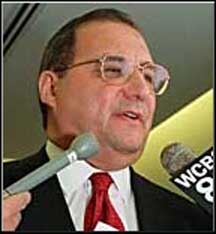 |
Others who predicted a wave of anti-Semitism aren’t dissuaded either by the facts. Perhaps the most outspoken critic of the film, Abraham Foxman of the Anti-Defamation League, isn’t convinced that we’re yet out of the woods. "Ask me a year down the road," Foxman says, noting that the movie will be out on DVD Aug. 31 and will be used by churches on youth retreats. "People who saw it in theaters saw the movie in an atmosphere of national debate and discussion" that diluted the film's anti-Semitic impact, he says. With the DVD, that calming influence will be gone, he adds. Calming influence! Is Mr. Foxman making a joke? His rhetoric, as you might recall, was anything but calming. Hysterical, maybe. Provocative, perhaps. Calming, no way. |
|
Abraham Foxman, a calming influence? |
||
Rivenburg’s article also shows that much of the Christian hype about The Passion of the Christ was overblown. In particular, those who predicted massive numbers of conversions to Christ because of the movie were shown to have been thinking wishfully. However, the article does mention two churches that experienced large numbers of conversations when movie viewing was combined with an intentional evangelistic and educational effort.
Rivenburg cites a recent survey by the Barna Group, which found that the number of conversions among those who say The Passion of Christ was less than one-tenth of one-percent. This doesn’t sound like much, but if you run the numbers the result is surprising. Barna found that 31% of adult Americans saw The Passion, or 64,000,000 people (31% of the 208,000,000 adults in the U.S.). If less than one-tenth of 1% converted – let’s assume, conservatively, that it was actually one-twentieth of 1% -- this means that 32,000 adult were converted to Christianity as a result of the movie. Now I don’t know about you, but I’m rather impressed by this figure. Yes, it doesn’t match the early hype by some Christian leaders, but it isn’t something to sneeze about.
Finally, Rivenburg, following the insights of George Barna, recognizes that the real, lasting impact of The Passion of the Christ is more subtle, but not therefore insubstantial. Barna’s survey found that one in ten viewers of the movie indicated that they had changed some aspect of their religious belief or practice after seeing it. This report came, by the way, about three months after people had seen the movie. So we’re talking about more lasting impact than an immediate emotional response.
In the May/June issue of Worship Leader magazine (not online, but can be purchased) I shared some “Second Thoughts” on The Passion. Here was my conclusion, which, after Barna’s survey, I affirm now more than ever:
Finally, although The Passion of the Christ offers ample opportunities for evangelism and education, perhaps the greatest opportunity of all is devotional. This film has moved Christians to see Christ more clearly, to love him more dearly, and to follow him more nearly. Ironically, the ultimate evangelistic impact of The Passion may not be its immediate witness to non-believers or even its provocation of questions about Jesus. The Passion of the Christ, by helping believers to experience the gospel more profoundly, has instilled within us the kind of devotion to Christ that we simply cannot contain. By helping us fathom the deep, deep love of Jesus for us, and by tenderizing our hearts so that we might love others, The Passion of the Christ has reawakened the church. And, from the day of Pentecost onwards, the enlivened, empowered church of Jesus Christ has always been, and will continue to be, the greatest evangelistic opportunity ever.
And Now for a Little Fun . . . It's Tool Time!
Posted at 10:00 p.m. on Sunday, July 18, 2004
Every summer my church sponsors Vacation Bible School for children 4 through 12. But VBS is anything but school. It’s an extravaganza of fun and food, all meant to convey solid biblical themes. This year our overall theme as “Construction, Inc.” We focused on God’s work in the world and in us through Jesus Christ.
For the last several years I’ve been centrally involved in VBS, playing a character in a skit that teaches as it entertains. Along with other leaders from my church, I get to ham it up for the sake of our children.
| This year we did a spoof of the television show “Home Improvement,” complete with Tim “The Tool Man” Taylor, Al “His Trusty Assistant” Borland, and Wilson, the all-wise neighbor whose face we never quite see. I played the role of Tim, which required, among other things, some startling physical transformation. Oh, the things I do for the work of Christ! (Note: While I lost a beard for the sake of VBS, my associate pastor Tim grew a beard, much to the chagrin of his wife.) | 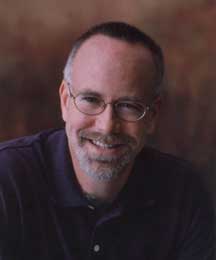 |
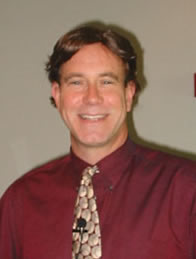 |
I thought you might enjoy a script from one of our skits. So, here it is.
“Following the Plan”
Characters: Tim Taylor; Al Borland; Heidi; Wilson
[Heidi enters to center stage.]
Heidi: Does everybody know what time it is?
Kids: Tool Time!
Heidi: That's right. Binford Tools is proud to present Tim "The Toolman" Taylor! Whoo-hoo.
[The audience cheers. The "Tool Time" theme starts. The doors open, while Tim and Al walk out to the set]
Tim: Thank you. Thank you. Thank you, Heidi. I’m Tim “The Tool Man” Taylor. And this, of course, is my trusty assistant, Al “The Bearded One” Borland.
Al: That’s right, Tim. Say, what do you think of this beard?
Tim: I think it looks like you’ve been bobbing for apples in tub of cow manure, Al.
Al: I don’t think so, Tim. [To kids] Say, what do you think of my beard? [They cheer] See, Tim, it looks pretty good.
Tim: Well, maybe I’ll have to grow a beard sometime too. I’ve always thought they were rather crass, though, Al, mainly for lowlifes.
Al: Tim, we’ve got a great show tonight. We’re going to teach people how to follow plans when you build something.
Tim: Ah, Al, I think plans are for wimps, rather like yourself, Al “The Wimpman” Borland.
Al: I don’t think so, Tim. All the great builders use careful plans.
Tim: Not me. I can build using the powers of my creative mind. I don’t need plans. I just go with my male testosterone gut instinct. I bond emotionally with the wood, and great things happen. Look, check out this chair I made yesterday. No plans, no directions. Just me and the wood becoming one together. Woof-woof-woof.
[Shows Al his chair. Al seems impressed.]
Al: Well, Tim, maybe you can build without plans. That looks pretty good.
Tim: Yep, it’s perfect. Solid. Manly. Strong and sturdy. Woof-woof-woof.
Al: Say, do you think I could sit on it?
Tim: Sure, Al. It can even hold you.
[Al climbs onto the chair and sits.]
Al: Hey, this feels pretty good.
Tim: You bet, Al. Lean back and enjoy.
[Al leans back, but the back of the chair falls off. Al begins to fall, but Tim catches him at the last minute. They struggle for a few seconds.]
Tim: Al, I’m so sorry. You almost got really hurt.
Al: Yeah, Tim. I’m okay. But that chair of yours fell apart.
Tim: Yeah. Sigh! I need some help.
Wilson: Hidy-ho, good neighbor. Tim: Hello, Wilson. What are you up to today? Wilson: Well, Tim, I’m trying to determine the potential salvage power and economic benefit of electromagnetism. Tim: [confused.] Woof? |
 |
|
Tim and Wilson, from the real Home Improvement |
||
Wilson: Well, you see, I found this old plan in an old edition of My Friend the Magnet to build my own electromagnet. But frankly, it seemed a little puny. So I boosted the amperage and quadrupled the power, and it seems to work much better. See, it even pulled all these nails out of that old pile of wood lying over there [Hands over a bunch of nails to Tim]. You know, I could have sworn that was a chair! I just don’t know whether there’s enough economic upside to salvaging nails. But you look sad, good buddy. What’s the problem? Tim: I made this chair yesterday. Tried to do it without any plans. It looked great. But then on the show today, Al sat on it. He leaned back and the chair broke. Al almost got badly hurt. It was embarrassing, Wilson. |
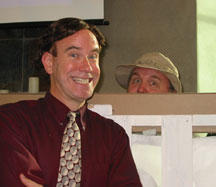 |
|
Not a bad imitation for a couple of rank amateurs! |
||
Tim: I made this chair yesterday. Tried to do it without any plans. It looked great. But then on the show today, Al sat on it. He leaned back and the chair broke. Al almost got badly hurt. It was embarrassing, Wilson.
Wilson: Well, Tim. You can’t build something without plans. Nobody can. Not even God. Did you know that God had a plan before he began to create the universe. That’s right. And he also had a plan for how to save the world. He followed this plan carefully, and that’s why Jesus came as our Savior. There’s a big word that theologians use to talk about God’s plan. It’s called providence. God’s providence is his perfect plan.
Tim: Providence?
Wilson: Yep. That’s is. Providence. God’s perfect plan being worked out in all of creation, even in you, Tim.
Tim: Providence. God’s plan. God’s plan for me. Providence.
Wilson: Remember Proverbs 21:5: “The plans of the diligent lead surely to abundance, but every one who is hasty comes only to want.”
Tim: Hey, thanks, Wilson. That’s just what I needed.
[Tim hurries back to the set.]
Al: Tim, are you okay? You seemed pretty upset before. Don’t worry, I can feel your pain, my friend? I have deep empathy.
Tim: Don’t fret about it, Al “Who Feels My Pain” Borland. I’m fine now. I’ve learned that you’ve gotta have a plan when you build things. Hey, even God has a plan. It’s something the neo-Trojans call probably dents. I guess it means that even the best plan probably has some dents in it. I don’t know. Probably dents.
Al: I don’t think so, Tim. What you should have said is that theologians – they’re people who write about God – speak about God’s providence. Providence, it’s God’s perfect plan being worked out in the world. Providence.
Tim: Right again, Al “I Know All the Big Words” Borland. Providence. God has a plan for everything, even me, even you. . . . Speaking of a plan, this TV station has a plan to end this show in about one minute. So that’s all for today. On behalf of Al “I Know Big Words” Borland, I’m Tim “The Tool Man Who Uses Plans” Taylor. See you tomorrow.
[Home Improvement theme music begins.]
A Minister for Robert Reich?
Posted at 10:00 p.m. on Friday, July 16, 2004
Just when you thought things couldn’t get any stranger . . . .
First, a leading political figure in the U.S. announces that the greatest threat to the world comes from those who believe in God. Then, a Lutheran minister in Denmark is suspended from his pastorate for . . . preaching that God and heaven don’t exist. According to an AP wire story, the government of Denmark recently upheld the clerical suspension of the Rev. Thorkild Grosboell, pastor of Taarbaek, a small town north of Copenhagen. It all began in May of 2003, when Grosboell said in an interview that “there is no heavenly God, there is no eternal life, there is no resurrection.” Grosboell was suspended from the state-controlled Evangelical Lutheran Church for these remarks. Later he retracted them and was reinstated. But in May of this year Grosboell retracted his retraction, saying from the pulpit: “God has abdicated in favor of his son, hence in our favor. Therefore there is no longer a heavenly guarantee or an interfering might, there is only the godly kingdom (on earth) that is achieved by us and between us. So if it fails, there is nothing.” |
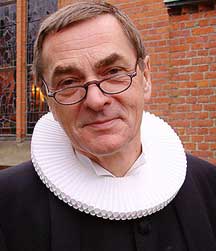 |
|
The Rev. Thorkild Grosboell. There's no truth to the rumor that he was sacked for wearing a sugar donut around his neck. |
||
No Grosboell isn’t the first one to come up with such an idea. In fact his point of view would be welcome in the Unitarian-Universalist church. So I’m not particularly surprised by the fact that the Rev. Grosboell believes such things. In the realm of theological discourse he’s not even close to the wacky fringe.
 |
Yet I find three things amazing in this story. The first is that the Rev. Grosboell professed his atheism, while still expecting to remain a minister in the Evangelical Lutheran Church. Lutherans, when I last checked, even liberal ones, still believe in God and some kind of eternal life. It would be rather like Colin Powell denouncing President Bush today and announcing that he was going to throw all of his support behind John Kerry in the next election, and yet still thinking he was welcome in the Bush administration. Surely Rev. Grosboell could have been more honest, indeed, even heroic, by renouncing his ordination as a sign of his new-found faith (or, lack thereof). | |
Probably won't happen. . . |
||
The second mystery is the Rev. Grosboell’s retraction. Okay, so I know pastors say stupid things sometimes. I’ve said plenty in my time, and I've had to apologize or retract. But you’d expect that if I were to renounce belief in God, I’d have thought about it pretty carefully before I did it. Things like this don’t usually promote longevity in pastoral work. So what sense does it make for Grosboell to retract his scandalous statement? Was he expecting that his congregation would forget and happily continue to listen to his preaching? (Apparently, they did!)
The third mystery is that the Rev. Grosboell’s suspension from ministry was lifted after his retraction. Now I’m all for grace and forgiveness and stuff like this. But if one of the pastors under my charge publicly renounced faith in God, I’d say that this person just wasn’t fit for pastoral ministry, retraction or no retraction. (I suppose I’d relent if it turned out that my God-rejecting associate pastor had been captured by an evil villain and been given some mind-altering drug. Otherwise, I’d encourage this pastor to look for another line of work. Period.)
At any rate, all might not be lost for the Rev. Thorkild Grosboell. He may be able to get a job with Robert Reich.
Gay Marriage: So What’s the Problem?
Posted at 10:30 p.m. on Wednesday, July 14, 2004
Although the Senate vote today ends one skirmish over gay marriage, the war is far from over. In this post I want to try and clarify one of the key issues in the battle.
Perhaps the most persuasive argument made by those who support gay marriage is the “no harm, no foul” argument. “Look,” advocates say, “if gay people get married, how could this possibly hurt anybody else? Nobody’s attacking traditional marriage here. We simply want two adults who love each other to be able to enjoy the benefits and responsibilities of marriage. What’s wrong with that? Who’s going to get hurt?” When you couple this argument with pictures of gay couples who have just been “married,” standing in the midst of smiling family and friends, you have a powerful visceral case in favor of gay marriage. It seems to be all about love and commitment, without any disparagement of traditional family relationships.
Several months ago I posted some thoughts on the difficulty of evaluating the potential harm that gay marriage might in fact do to our society. In think it’s time to dust off that piece and put up a revised version.
Opponents of gay marriage have argued that allowing gay marriage, not just gay unions of some sort, chips away at one of the basic building blocks of civil society. "The implications for our nation are dire," they allege. "By redefining marriage you're messing with things far bigger than they might first appear. If this continues, the harm will be momentous, including the dissolution of the family, the improper raising of children, and the fundamental disordering of our society." (For this perspective, see the discussion by Jim Berkley.)
One problem with this conservative argument is that it is theoretical and philosophical, not visual or emotional. Thus it doesn't have much bite in a society dominated by images and feelings. We can watch on TV as gay couples pledge their lives to each other, crying for joy and sharing their celebrations with friends and family. But there aren't any counter-balancing scenes of society being injured by gay marriage. We don't see images of maladjusted children on the CBS Evening News, only the angry faces of anti-gay activists complaining about those who have just celebrated love and commitment. When it comes to the all-important image game, gay marriage is winning hands-down.
How in the world can conservatives persuade people of the potential dangers of gay marriage? What images could conservatives display that would illustrate the negative results if our society were to endorse marriage between people of the same gender? Perhaps they should show excerpts from the 1986 horror thriller The Fly.
| Now before you dismiss this thought as bizarre or accuse me of saying that gay people are horrible monsters (I am not!), let me explain. In David Cronenberg's remake of the 1958 classic film, Seth Brundle (played by Jeff Goldblum) is a brilliant scientist who has invented a machine that teleports a person electronically from one place in space to another. When he tests this machine on himself, a fly joins Brundle in one of the telepods. As he is transported, his DNA is joined to that of the fly. The basic building blocks of Brundle's existence - his genes - have been forever altered. |
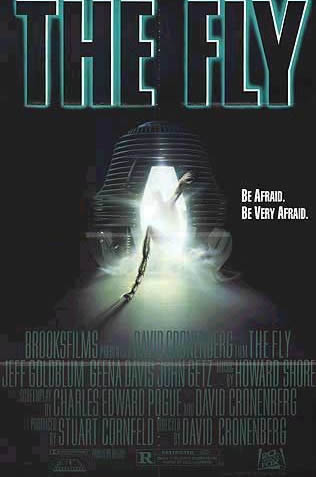 |
 |
"What in the world does this have to do with gay marriage?" you must be wondering. Well, I'll get to that in a minute. But first I need to introduce another bug-joins-man movie. In the 2002 blockbuster, Spider-Man, high school student Peter Parker is on a field trip to a scientific lab when he is bitten by a genetically-enhanced spider. As a result, his genes are altered, and, rather like Seth Brundle in The Fly, Peter Parker becomes a being whose genes are a human and insect combination. |
In both movies the immediate results of the genetic changes in the protagonists are positive. Both have new strength and vigor. Both are thrilled by their new lives. But soon their experiences diverge. Whereas Peter Parker (aka Spider-Man) becomes a superhero, Seth Brundle (aka Brundle-Fly) becomes a hideous monster. The same basic cause (genetic change from insect interaction) turns out to have radically opposed effects.
So here's my point. Marriage is one of the fundamental building blocks of our society, an essential part of our social DNA, if you will. Altering this social gene will change our society forever. Either it will be much better, a superhero society of new human freedom and dignity, or it will be much worse, an impoverished society of human brokenness and confusion. There isn't middle ground. One who argues that redefining marriage is no big deal completely underestimates the extent to which marriage is essential to our social DNA, for better or for worse.
Advocates of gay marriage try to use the "it's no big deal" argument because that's the course of least resistance. But it's naïve, if not disingenuous, to minimize the social change they are demanding. Changing the definition of marriage will make a huge difference in our society. If I were an advocate of gay marriage, I would argue that we need to make such a difference, that the new social order, which redefines marriage to make gender irrelevant, will be better than the current social order. But I could not and would not ever argue that it really doesn't matter all that much.
| What about the "happy gay couples with no harm to society" argument? One main problem with this argument is that it's simply way too early to tell if changing social DNA will lead to Spider-Man or The Fly. Remember, both Peter Parker and Seth Brundle at first experienced ecstasy in their genetically-reordered states. Life seemed to be better for both of them. But, in time, the negative consequences of Brundle's DNA switch began to appear, at first minimally, and then horribly. Gay marriage advocates claim that the DNA transformation in our society is a good one, and they point to the gay images from San Francisco and elsewhere. But the fact is that these folks have no idea what will be the long term effects of this societal DNA change. Although things might look good on the surface, we may very well be in the "early Brundle-Fly" stage of euphoria. So, without transcendent moral guidance in the matter of gay marriage, nobody can know that the long-term result of this social change will be positive. Scenes of rejoicing gay couples in San Francisco could be as misleading as images of Seth Brundle enjoying his newfound vigor as Brundle-Fly. |
 |
Those of us who believe that we do in fact have transcendent guidance for life don't have to engage in perilous social experimentation to know what's best for human society. The Bible has made it clear from the beginning that marriage should be between one man and one woman. We have no reason to believe that God's mind has changed in the matter. It would be truly sad if our society had to discover by experience the implications of rejecting God's design for our social DNA.
Spider-Man 2 is "Pro-Choice"
Posted at 11:30 p.m. on Saturday, July 10, 2004
Just saw Spider-Man 2 for the second time. And, once again I come away marveling at the values of this movie. Most of all, I appreciate its clearly “pro-choice” stance.
Please understand that I’m using “pro-choice” in a atypical fashion. Spider-Man 2 has nothing to do with abortion. It is pro-choice in a more fundamental sense. The movie holds up the importance of choosing how we are to live, and making morally right choices at that. In an age of victimization, where people hide behind their injuries to avoid taking responsibility for their actions, Spider-Man 2 makes a strong contrary statement. Several of the major characters, including Spider-Man/Peter Parker himself, find themselves with difficult choices because of things that happened to them that were beyond their control. Peter Parker, after all, didn’t ask to be bitten by a radioactive spider. Nor did Doctor Octopus seek his own sorry fate. But, though each of these characters indulged in a brief pity party, neither tries to avoid making tough choices by claiming to be a victim of bad luck. |
 |
What’s especially refreshing about Spider-Man 2 is it’s fundamental theme, namely that of choosing self-sacrifice for the good of others. The movie puts it this way: “Sometimes you have to give up the thing you want the most.” I could quibble about the details. In fact what Spider-Man 2 actually proves is that sometimes you have to give up what seems to be best for yourself in order to serve some greater good. Sometimes you have to sacrifice your own pleasure for the sake of others. Sometimes you have to give up what you think you want the most because you discover that you actually want something more, something nobler, something costly, something that makes the world better even if you must suffer. And, even if certain characters do make self-serving choices, even these come with considerable cost.
Without giving away too much about this film (and the next in the series), it does appear that one major character may end up making a gigantically wrong choice. So Spider-Man 2 isn’t overly romantic in this regard. But the potential for making genuinely wrong choices highlights the reality and the difficulty of making genuine good choices.
For the record, the comic-book violence of Spider-Man 2 is such that parents of younger children should be cautioned. Check out Screen It’s detailed review for more information. But I must say it’s refreshing to see a movie that actually encourages people to make wise, thoughtful, and even sacrificial choices in life. I would recommend this movie highly to people who want to see a fantastic action flick that has a strong moral message to boot.